Pot o’ Gold. Films reviewed: French Girl, One Life, Love Lies Bleeding
Hi, this is Daniel Garber at the Movies for culturalmining.com and CIUT 89.5 FM.
Tomorrow is St Paddy’s day so this week I’m looking at three new movies, from Canada, England and the US, about people looking for their own pot o’ gold. There’s a New Yorker in Quebec looking for love, an Englishman in wartime Prague searching for orphans to rescue, and a young woman in New Mexico looking to flee to Vegas with her bodybuilder girlfriend.
 French Girl
French Girl
Wri/Dir: James A. Woods, Nicolas Wright
Sophie and Gordon are an unmarried couple in New York in their late 30s. Gordon Kinski (Zach Braff) is an eighth grade English teacher in a public school in Brooklyn. He loves donning 16th century tunics to teach Shakespeare to 14 year olds. Sophie Tremblay (Evelyne Brochu) is a wizard in the kitchen — professional kitchens that is. She’s the chef at a popular restaurant. They’re getting ready for a long-planned vacation in upstate New York, far away from their jobs. But their plans are changed when a strange woman appears. Ruby (Vanessa Hudgens) is a celebrity chef with cooking shows and restaurants all around the world. She wants Sophie to audition for executive chef at her newest branch. The restaurant is in the Chateau Frontenac in Quebec City, Sophie’s home town. For Gordon, who has rarely left NY City, Quebec is terra incognito. But he agrees to come with her, thinking it’s the perfect time to propose marriage. He also will offer moral support and meet her family. And what a family it is.
The Tremblays live on their sheep farm near Quebec City. There’s an angry Dad, a doting mom, a gossipy older sister, and Junior
(Antoine Olivier Pilon) an intimidating cage boxer who collects samurai swords. And then there’s their elderly grandma who has a tendency to pop up beside their bed when they’re having sex. Gordon, who speaks no French, feels very out of place, but still tries desperately to fit in. What he doesn’t know, but the  family does, is that Ruby, Sophie’s potential future boss, is also her former lover. Will Sophie get the job? Will her family accept Gordon? And is the rich and glamorous Ruby competing with him for Sophie’s hand?
family does, is that Ruby, Sophie’s potential future boss, is also her former lover. Will Sophie get the job? Will her family accept Gordon? And is the rich and glamorous Ruby competing with him for Sophie’s hand?
French Girl is a funny and cute romcom about a culture clash between an eccentric family and a fish out of water. It’s also bilingual — the Tremblays speak French while Gordon and Ruby speak English. While French Girl follows many of the cliches and conventions of a romantic comedy, it still seems sweet, fresh and delightful.
I liked it despite myself.
 One Life
One Life
Dir: James Hawes
It’s the late 1980s in a small city in England. Nicky Winton (Anthony Hopkins) is a retired stockbroker who lives with his wife Greta (Lena Olin). They’re expecting a visit soon from their expecting daughter, so she tells him to throw out all his junk to make way for baby. He has tons of files and papers from the 1930s he hasn’t looked at in years. Plus a treasured leather briefcase with a photo album in it. Everything in the album happened in 1938. That was when Hitler invaded Czechoslovakia to annex the “Sudetenland”, sending thousands of refugees — including Jews, intellectuals, leftists, Socialists, and Communists — to Prague to stay out of Nazi hands.
A much younger Nicky (Johnny Flynn) visits Prague and is overwhelmed by all the refugees, including countless children, many orphans, living in the streets. He wonders, how many children could he transport by train to England before Germany invades Prague? There were similar programs for kids in Austria and Germany, but not Czechoslovakia. His German-born mom (Helena Bonham-Carter) says she’ll do whatever she can to help. And a team in Prague is recording names of kids  who can be saved. Can Nicky convince the British government to issue visas, raise the needed funds, and find foster parents to take care of them? Will he get them out before the Nazis march in? Or is it a fools game?
who can be saved. Can Nicky convince the British government to issue visas, raise the needed funds, and find foster parents to take care of them? Will he get them out before the Nazis march in? Or is it a fools game?
One Life is an historical drama — based on a true story — about an unsung hero and what he accomplished in 1938. The story jumps back and forth between the 30s and the 80s, half about the daring mission of a young man, and half about the old Nicky telling his story. I wanted to see this film for two reasons: because of the story — who doesn’t want to see children rescued from the Nazis? — and because it’s directed by James Hawes, who brought us that excellent TV spy thriller series Slow Horses. Sadly, One Life couldn’t possibly be less thrilling. While there are a few touching moments near the end, most of this film is as slow as molasses. Hopkins sleepwalks through his part while the audience nods off.
Sad to say, One Life is a snooze fest.
 Love Lies Bleeding
Love Lies Bleeding
Co-Wri/Dir: Rose Glass
It’s 30 years ago in a small town in New Mexico. Lou (Kristen Stewart) works at her estranged father’s hardcore gym, a rusty warehouse filled with muscleheads spouting No Pain No Gain slogans. Most of her time is spent unclogging toilets with her bare hands or fending off the amorous advances of a crackhead named Daisy (Anna Baryshnikov). It’s a hell-hole. Until a breath of fresh air blows in through the door. Jackie (Katy O’Brian) is a competitive bodybuilder in pink and purple lycra with big hair and bigger muscles. She’s an Okie just passing though town on her way to a competition in Vegas. But when she decks two lugs who threaten Lou, it’s love at first punch. Soon they’re making passionate love in Lou’s lonely apartment. Soon enough, she’s supplying Jackie with steroids to reach body perfection before they head off to Vegas.
But all is not well in rural New Mexico. Lou’s brother in law, JJ (Dave Franco) is a mega-douche who works for her Dad, Lou Sr’s (Ed Harris). Lou Sr is a crime boss who runs the town from his gaudy mansion. When JJ’s not cheating on his wife (Lou’s sister), he’s beating her up. And he has hired Jackie to work at Lou Sr’s gun club, after she agreed to have sex with him. (She doesn’t yet know that Lou is related to all of them). But when the truth comes out, and Lou’s sister ends up in ER, Jackie is  jacked. She slips into a manic ‘roid rage looking for revenge, while pulling Lou into a spiral of violence, death and retribution. Will Jackie make it to Vegas? Will someone pay for the murders? And where will the dead bodies go?
jacked. She slips into a manic ‘roid rage looking for revenge, while pulling Lou into a spiral of violence, death and retribution. Will Jackie make it to Vegas? Will someone pay for the murders? And where will the dead bodies go?
Love Lies Bleeding is a brilliantly dark film noir, about small-town crime in the southwest. It’s filled with distorted psychedelic fantasies within a tragic world. It’s also a love story filled with lots of hot lesbian sex. The production design is amazing. Most of the characters sport 80s mullets and the whole movie pulses with a driven soundtrack and neon colours. This is only Rose Glass’s second feature (after Saint Maud) but she once again incorporates real settings within a surreal plot. This one includes a behind-the-scenes look at professional bodybuilding, complete with spray-on suntans and their strangely contorted muscle-popping poses. But beware — the  movie is filled with shocking, graphic violence. Dave Franco is great as a sleaze ball, a grizzled Ed Harris is suitably sinister as a crime boss with foot long greasy blond hair spouting beneath a completely bald tonsure. Anna Baryshnikov (the dancer’s daughter!) is perfect as a hippy girl long past her prime. And Kristen Stewart and newcomer Katy O’Brian absolutely sizzle together.
movie is filled with shocking, graphic violence. Dave Franco is great as a sleaze ball, a grizzled Ed Harris is suitably sinister as a crime boss with foot long greasy blond hair spouting beneath a completely bald tonsure. Anna Baryshnikov (the dancer’s daughter!) is perfect as a hippy girl long past her prime. And Kristen Stewart and newcomer Katy O’Brian absolutely sizzle together.
If you’re looking for a crime-thriller that’s gripping, shocking and aesthetically stunning, don’t miss Love Lies Bleeding.
One Life, French Girl, and Love Lies Bleeding all open this weekend in Toronto; check your local listings.
This is Daniel Garber at the Movies, each Saturday morning, on CIUT 89.5 FM and on my website culturalmining.com.
Life, death. Films reviewed: Lisa Frankenstein, Perfect Days
Audio: Coming soon!
Hi, this is Daniel Garber at the Movies for culturalmining.com and CIUT 89.5 FM.
This weekend is Lunar New Year, a time to push out the old year and bring in the new one, and to think about long-gone ancestors. This week, I’m looking at two new movies both opening this weekend about life and death. There’s an older man who lives his life to the fullest, and a young woman who exults in death and misery.
 Lisa Frankenstein
Lisa Frankenstein
Dir: Zelda Williams
It’s the 1980s. Lisa Swallows (Kathryn Newton) is a unhappy teenager in Wisconsin. She is socially awkward with frizzy hair who loves reading sad poems and listening to The Cure. She works part-time mending garments at a dry cleaner. She moved there with her hapless father who recently remarried after her mom died. Her new stepmother (Carla Gugino), a Nurse Ratchet manqué, treats her like trash. But her stepsister, Taffy, a popular and chirpy cheerleader, (Liza Soberano) goes out of her way to cheer Lisa up. She lets her use her makeup and wear her clothes, to no avail. Lisa prefers to hangout in cemeteries mooning over long-dead young men. The one living guy she’s crushing on is Micheal (Henry Eikenberry), the editor of the school paper. But he already has a girlfriend, a goth rocker who is bigger and meaner than Lisa.
After an awkward incident at a pool party, she gets sloshed on Absinthe and ends up in Bachelor’s Grove, her secret  graveyard hangout. And, unknowingly, in a pique of drunken wishful thinking, she conjures back to life a young man buried there more than a century earlier. And soon she hears a knocking at her door. It’s a moaning monster (Cole Sprouse) covered in dirt with worms crawling out of his ears, and missing a number of body parts. She screams and runs away, but, gradually she figures out who he is and what he means to her. And after washing him, dressing him up, and putting him in the tanning bed, she decides he isn’t half bad. Lisa changes too, gaining new self-confidence. And she puts her seamstress skills to work by sewing new organs he gives her onto his body. The thing is, these body parts come from people he murders. Will Lisa become a Bonny to his Clyde? And can a human find love with a reanimated corpse?
graveyard hangout. And, unknowingly, in a pique of drunken wishful thinking, she conjures back to life a young man buried there more than a century earlier. And soon she hears a knocking at her door. It’s a moaning monster (Cole Sprouse) covered in dirt with worms crawling out of his ears, and missing a number of body parts. She screams and runs away, but, gradually she figures out who he is and what he means to her. And after washing him, dressing him up, and putting him in the tanning bed, she decides he isn’t half bad. Lisa changes too, gaining new self-confidence. And she puts her seamstress skills to work by sewing new organs he gives her onto his body. The thing is, these body parts come from people he murders. Will Lisa become a Bonny to his Clyde? And can a human find love with a reanimated corpse?
Lisa Frankenstein is a mildly humorous, high school horror rom-com about a self-styled Dr Frankenstein and the dead man she resurrects. It’s done in a brightly-coloured campy aesthetic, with lots of goth-punk tunes playing in the background. The problem is, it’s not as funny as it thinks it is. It has a slapdash feel to it, and comes across as clunky and misguided. And it seems to side with the conventional, popular kids, portraying the oddballs and introverts as the psycho-killer bad guys. It borrows liberally from horror-comedies like Edward Scissorhands and Buffy the Vampire Slayer, but without any pathos for the main characters. There are some good parts: a gross-funny sex scene, and some lovely paper silhouettes that tell the monster’s back story. But most of the movie is as painfully awkward and misbegotten as the monster himself.
I found Lisa Frankenstein disappointing.
 Perfect Days
Perfect Days
Co-Wri/Dir: Wim Wenders
It’s present-day Tokyo. Hirayama (Koji Yakusho) is a single man in his sixties. He lives a simple life.in a spotless, but threadbare, apartment in a rundown part of town. He likes reading novels, listening to music in his little white minivan he drives and eating lunch outdoors on a park bench. He is thoroughly dedicated to his profession, performing each task with scrupulous care and attention. He’s never late and never breaks the rules, checking off each task as he completes it. What’s surprising, though, is the nature of his job. He cleans the toilets in public parks. And he does so with a smile on his face and a kind word to passersby.
But his daily routine is disrupted by a young assistant, Takashi (Emoto Tokio). Takashi is filled with troubles — he’s undependable, always broke, and perpetual problems with his girlfriend. He needs special attention and special favours. And he’s trying Hirayama’s patience. And when an unexpected visitor shows up at his door in a very expensive car delivering unexpected news, he has to rethink his life. How did Hirayama end up where he is today? What is he running away from? And who will take his place when he retires?
Perfect Days is a wonderful study of a few days in the life of a  kind, generous and warmhearted man. It’s a joy to watch. Dialogue is sparse to non-existent evoking Jaques Tati and Charlie Chaplin in its perfect simplicity. But it’s not silent. Music plays a big role, mainly singers from the 60s and 70s — Patti Smith, Velvet Underground, Van Morrison — on the cassette tapes he listens to as he drives around. The movie is filled with details, and tiny, continuous storylines, like the anonymous notes he finds in a crack in a wall in a ladies room. Even the toilets themselves are amazing! Things like opaque, tinted glass that magically becomes transparent when you leave the booth, and rest stops disguised as rustic log cabins. And thankfully, no potty mouth or toilet humour anywhere. Though directed by German filmmaker Wim Wenders, this is a quintessentially Japanese movie; it’s even their Oscar nominee this year.
kind, generous and warmhearted man. It’s a joy to watch. Dialogue is sparse to non-existent evoking Jaques Tati and Charlie Chaplin in its perfect simplicity. But it’s not silent. Music plays a big role, mainly singers from the 60s and 70s — Patti Smith, Velvet Underground, Van Morrison — on the cassette tapes he listens to as he drives around. The movie is filled with details, and tiny, continuous storylines, like the anonymous notes he finds in a crack in a wall in a ladies room. Even the toilets themselves are amazing! Things like opaque, tinted glass that magically becomes transparent when you leave the booth, and rest stops disguised as rustic log cabins. And thankfully, no potty mouth or toilet humour anywhere. Though directed by German filmmaker Wim Wenders, this is a quintessentially Japanese movie; it’s even their Oscar nominee this year.
Perfect Days is a perfect film.
Lisa Frankenstein and Perfect Days both open this weekend in Toronto; check your local listings.
This is Daniel Garber at the Movies, each Saturday morning, on CIUT 89.5 FM and on my website culturalmining.com.
Films reviewed: Orlando: My Political Biography, Fallen Leaves
Hi, this is Daniel Garber at the Movies for culturalmining.com and CIUT 89.5 FM.
Toronto’s Fall film festival season continues in December with the Jayu Human Rights film festival showing insightful documentaries on pertinent issues, along with a slam poetry competition at the Ace Hotel.
But this week, I’m looking at two new European movies that played at TIFF this year and are now in cinemas. There are trans shape-shifters in France and lonely job-seekers in Finland.
 Orlando: My Political Biography
Orlando: My Political Biography
Wri/Dir: Paul B. Preciado
It’s 17th century, Elizabethan England. Orlando is a teenaged boy, a handsome courtier in the Queen’s castle. He’s also an aspiring writer, waxing lyrical on oak trees and winter frosts. He falls in love with Sasha, a blonde, Russian aristocrat. But at the age of 30, he wakes from a deep sleep transformed into a woman. Orlando’s life takes her (and him) through various guises over hundreds of years, to capitals as far away as Constantinople, until finally returning by ship to 20th century London, where they finally complete and publish their book. Such is the “biography” of Orlando in Virginia Woolf’s famous novel. So what’s different about this film?
For one thing, the entire cast is trans or non-binary, as is Preciado, the director. And the cast is huge. Each version of Orlando is played by another actor, their sex, gender and sexuality presented in a myriad of ways. Orlando is plural in this incarnation. Not just that, Orlando’s race, colour and language also shifts, with the actors ages ranging from small children to the elderly. Some characters wear chainmail like Joan of Arc, while others recline, luxuriantly, in an Ottoman seraglio. The one common factor is their Elizabethan white  neck ruffs, the fashion of the day.
neck ruffs, the fashion of the day.
Orlando, My Political Biography is not the first film version of the novel — far from it. It seems to attract the most experimental and avant garde filmmakers out there. German director Ulrike Ottinger made Freak Orlando in 1981 which entirely rejects the conventions of both narrative and art movies. English director Sally Potter (see: The Roads Not Taken, The Party, Ginger and Rosa)’s Orlando of 1992 starred Tilda Swinton as the various Orlandos and featured Jimmy Sommerville singing up in a tree.
 But this French political biography adopts Bertolt Brecht’s (and Jean-Luc Godard’s) method of deliberately alienating the audience to promote a political stand. Each Orlando introduces their scene by announcing directly to the camera their real /adopted name and personal history, followed by their Orlando passage, often reading directly from a copy of Woolf’s book. But it remains engaging because of the beauty of the photography and costumes and the sincerity of the players in the film. Settings vary from deliberately artificial backdrops to an exquisite forest and a grotesque Parisian catacomb.
But this French political biography adopts Bertolt Brecht’s (and Jean-Luc Godard’s) method of deliberately alienating the audience to promote a political stand. Each Orlando introduces their scene by announcing directly to the camera their real /adopted name and personal history, followed by their Orlando passage, often reading directly from a copy of Woolf’s book. But it remains engaging because of the beauty of the photography and costumes and the sincerity of the players in the film. Settings vary from deliberately artificial backdrops to an exquisite forest and a grotesque Parisian catacomb.
The political stance is complex, and involves a rejection of the accepted binary. Some take issue with psychiatrists, surgeons and pharmacists having control of their identities and bodies.  Says one young Orlando: you must hate your genitals if you want the doctor to give you hormones… but I don’t hate my genitals. Says another: I adopted a ridiculous caricature of masculinity for a year after transitioning before realizing I shouldn’t erase my personal history just because I’m trans.
Says one young Orlando: you must hate your genitals if you want the doctor to give you hormones… but I don’t hate my genitals. Says another: I adopted a ridiculous caricature of masculinity for a year after transitioning before realizing I shouldn’t erase my personal history just because I’m trans.
Orlando, My Political Biography is equal parts intellectual lecture, political diatribe, performance art, and cinematic experiment, and, most surprisingly… it works.
 Fallen Leaves
Fallen Leaves
Wri/Dir: Aki Kaurismaki
It’s typical day in Helsinki, Finland.
Ansa (Alma Pöysti), a single woman in her thirties, works at a low-paying job in a supermarket. She lives in a small apartment and subsists on frozen microwave dinners. She likes listening to relaxing music, but her bakelite radio only plays bad news from the Ukrainian war these days. She does go out occasionally to a local karaoke bar, with her best friend Liisa (Nuppu Koivu). There she encounters — but doesn’t actually meet — Holappa (Jussi Vatanen). Holappa is a depressed guy who works as a welder at a small factory. He lives in the company dorm, along with acquaintances and his best friend and confident Huotari (Janne Hyytiäinen). He handles his depression with constant drinking, which only gets him more depressed. After a few near misses they finally meet face to face. Their first date? A zombie movie at a local rep cinema. Sparks fly and they vow to meet again soon. But various unfortunate coincidences seem destined to keep these soulmates far apart. Can they ever find happiness together? Or is this a relationship that can never happen?
Fallen Leaves is a tragicomic proletarian love story par 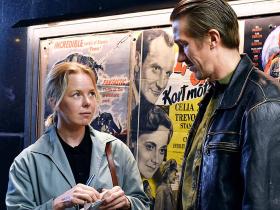 excellence. Its also a deadpan comedy, which despite it’s nearly tragic atmosphere, will have you laughing and crying all the way through. If you’ve ever seen an Aki Kaurismaki movie before you’ll instantly recognize his style: seedy bars, bearded bikers, dark rock n roll, and a noir-ish, retro feel. Similar to Jim Jarmusch, but much funnier. It also deals with real-life issues like alcoholism and poverty. Ansa loses her job for taking home an expired cookie instead of throwing it away, while Holappa is driven close to self- destruction by his constant boozing. If you haven’t seen his movies before, Fallen Leaves is a great one to start.
excellence. Its also a deadpan comedy, which despite it’s nearly tragic atmosphere, will have you laughing and crying all the way through. If you’ve ever seen an Aki Kaurismaki movie before you’ll instantly recognize his style: seedy bars, bearded bikers, dark rock n roll, and a noir-ish, retro feel. Similar to Jim Jarmusch, but much funnier. It also deals with real-life issues like alcoholism and poverty. Ansa loses her job for taking home an expired cookie instead of throwing it away, while Holappa is driven close to self- destruction by his constant boozing. If you haven’t seen his movies before, Fallen Leaves is a great one to start.
Everything in this film is retro. Finland is the high-tech home of Nokia and Supercell, but in Kaurismaki’s world the characters use avocado coloured landlines, with cel phones or video games  nowhere to be seen. Computers seem relegated to internet cafes. Phone numbers are written on slips of paper, blown away with the wind. Movie theatres only play classics, and every bar is on skid row.
nowhere to be seen. Computers seem relegated to internet cafes. Phone numbers are written on slips of paper, blown away with the wind. Movie theatres only play classics, and every bar is on skid row.
At the same time, there’s always a niceness and sweetness burbling just below the surface of the humdrum futility of everyday life. Fallen Leaves is a wonderfully depressing movie with a feel-good atmosphere. I love this movie.
Fallen Leaves and Orlando My Political Biography are both playing now at the TIFF Bell Lightbox, and at other theatres across Canada — check your local listings.
This is Daniel Garber at the Movies, each Saturday morning, on CIUT 89.5 FM and on my website culturalmining.com.
Autobiographies? Films reviewed: North of Normal, A Compassionate Spy, Shortcomings
Hi, this is Daniel Garber at the Movies for culturalmining.com and CIUT 89.5 FM.
August is here in Toronto, a great time for some outdoor screenings. TOPS — Toronto Outdoor Picture Show — is showing films for free, after dark at Christie Pits, Corktown Common, Bell Manor, Old Fort York and the Evergreen Brickworks, with no tickets or advance registration required — just show up and sit on the grass.
This week I’m looking at three new movies — a memoir, a doc and dramedy. There’s a hippy in a tipi in Yukon, a spy in Los Alamos, and a frustrated filmmaker in Oakland.
 North of Normal
North of Normal
Dir: Carly Stone
Cea Sunrise Person (Amanda Fix) is a teenage girl experiencing city life for the first time. She’s both naive and worldly. Her mother Michelle (Sarah Gadon) gave birth to her when she was only 15, and acts more like a sister than a mom. Since she was a child, she’s been raised, hippy style, in Yukon, by her grandparents, including Michelle’s dad Papa Dick (Robert Carlyle).
They shoot animals, go fishing and gather foraged foods. She grew up living in a tipi, where any visitor to their mobile encampments likely slept with one or more of the adults. She’s familiar with the concepts of free sex, a barter economy, and the use of soft drugs, as well as living off the grid, avoiding any government interference — Papa Dick hasn’t paid taxes in decades. So life down south (in an unnamed Canadian city) is totally alien to her. Though bright and friendly, she doesn’t understand school rules or social norms, and gets into fights with the locals. But she gradually adjusts — well, kind of — to a new life. But she really doesn’t get along with her mom’s new boyfriend, Sam (James D’Arcy) who happens to be a  married man. Why does Michelle always fall for the bad boys? But one thing keeps her steady: Cea holds onto a childhood wish to move to Paris; she carries an Eiffel Tower snow globe wherever she goes. So when she is approached on the beach by a legit modelling scout, she wonders if this will be the fulfillment of her dreams.
married man. Why does Michelle always fall for the bad boys? But one thing keeps her steady: Cea holds onto a childhood wish to move to Paris; she carries an Eiffel Tower snow globe wherever she goes. So when she is approached on the beach by a legit modelling scout, she wonders if this will be the fulfillment of her dreams.
North of Normal is a touching, coming-of-age film based on Cea Sunrise Person’s memoir about her unusual life (she ended up as a professional fashion model and entrepreneur.) She’s beautifully portrayed by Amanda Fix as a teenager and by River Price-Maenpaa as a little girl. And it’s shot amongst the forests and lakes of Canada’s north. The plot is eliptical, bouncing back and forward in time as her suppressed memories are gradually revealed, while leaving out large parts of her life. Even so, I liked this story.
 A Compassionate Spy
A Compassionate Spy
Dir: Steve James
It’s the 1940s and WWII is raging, and there are rumours the Third Reich is developing an atomic bomb. So the US government initiates the secretive Manhattan Project in Las Alamos, supervised by the Army. It’s a collection of scientists brought together to create the ultimate weapon before Germany does. Most of the names are already famous: Oppenheimer, Teller, Niels Bohr, von Neuman. But the youngest one of all is Ted Hall. Only 18 years old, the child prodigy has already graduated from Harvard. He’s an ardent leftist, and wants to defeat fascism in Europe. As a drafted soldier, he has to wear a uniform and sleep in a barracks on the site, but otherwise he works each day beside other scientists. Aside from his age, he is different from the rest of them in another way. He is passing intel to the Soviet Union. Hall is disturbed by the idea of an impending nuclear holocaust, and doesn’t trust the US government to show restraint, if they’re the only holder of such a dangerous tool. So totally independently — with the help of is best friend, Savvy Sax — he seeks out the Soviets to tell them what’s going on. Is he arrested? Put in the electric chair like Ethel and Julius Rosenberg? No, he (and his wife Joan) keep their secret for half a century.
A Compassionate Spy is a fascinating documentary packed with info that sheds light on what Hall did and why, and what became of his  life afterwards. Hall worked on cancer cures at the Sloane Kettering institute, and later became a professor at Cambridge University. Most surprising is that while he opposed the bomb, his own brother created and built ICBMs — Intercontinental Ballistic Missiles which may have brought the two sides closer to destruction.) The doc is made up of a confessional video Hall made before he died, new interviews with his wife Joan and their kids, as well as with Savvy Sax’s family. It also recreates dramatic scenes from the period, along with contemporary newsreels, diaries, letters and photos. Joan Hall is this really fascinating and feisty character who tells most of the story. Equally important, the film presents a lot of crucial information that is glossed over in the recent hit biopic Oppenheimer. Like the fact that many scientists (including Hall) petitioned FDR and Truman not to drop the bomb on Japan; the letter was stifled by Leslie Groves, and never sent. I never knew the US threatened to use the bomb on the USSR in 1946 after the Russian army occupied Iran. And lots more eye-openers. A Compassionate Spy is an excellent documentary by the Oscar-winning director of Hoop Dreams.
life afterwards. Hall worked on cancer cures at the Sloane Kettering institute, and later became a professor at Cambridge University. Most surprising is that while he opposed the bomb, his own brother created and built ICBMs — Intercontinental Ballistic Missiles which may have brought the two sides closer to destruction.) The doc is made up of a confessional video Hall made before he died, new interviews with his wife Joan and their kids, as well as with Savvy Sax’s family. It also recreates dramatic scenes from the period, along with contemporary newsreels, diaries, letters and photos. Joan Hall is this really fascinating and feisty character who tells most of the story. Equally important, the film presents a lot of crucial information that is glossed over in the recent hit biopic Oppenheimer. Like the fact that many scientists (including Hall) petitioned FDR and Truman not to drop the bomb on Japan; the letter was stifled by Leslie Groves, and never sent. I never knew the US threatened to use the bomb on the USSR in 1946 after the Russian army occupied Iran. And lots more eye-openers. A Compassionate Spy is an excellent documentary by the Oscar-winning director of Hoop Dreams.
 Shortcomings
Shortcomings
Dir: Randall Park
Ben (Justin H. Min) is an aspiring filmmaker in Oakland, California. After dropping out of cinema studies at Berkeley, he’s now he’s the manager of an art house theatre, so he still has a peripheral connection. He loves all women but treats any man as a potential competitor. His best friend is Alice (Sherry Cola), a queer Korean American. They hang together ogling girls in local cafes — for Ben, that’s mainly women with blonde hair. He acts as her beard, posing as her fiancé when she has to visit her conservative family.
He lives with Miko (Ally Maki) who also wants to make films; she’s involved with the local Asian American Film Festival. She’s the love of his life. But despite the fact that he, his girlfriend and his best friend are all Asian American he is quick to point he feels no racial identity or kinship, and loathes identity politics. His abrasive and defeatist attitude leads to frequent arguments with Miko. But everything changes when she suddenly moves to NY City for a film internship, leaving Ben unexpectedly unmoored. Does their temporary separation offer him a chance to explore his sexual fantasies (that is, sleeping with a white woman)? Or will he try to win Miko back again?
Shortcomings is a hilariously deadpan look at the life and thoughts of an Asian-American man. Its observations are simultaneously scathing social satire and self-deprecating humour. It’s based on the graphic novels of Adrian Tomine whom I’ve read for decades now, so I was worried the comics wouldn’t translate well into film.  Luckily, Tomine wrote the screenplay, and it’s told, like his comics, in a series of connected vignettes. The characters are brilliant — Justin H Min is sympathetically annoying as Ben, the guy who never misses a chance to mess things up. Sherry Cola is equally brilliant, as are the many priceless side characters — Autumn, a performance artist who photographs her own toilet use, Sasha, a frustrated bisexual, Leon, an annoying fashion designer who Ben calls a rice king, and Gene, a smug popcorn maker.
Luckily, Tomine wrote the screenplay, and it’s told, like his comics, in a series of connected vignettes. The characters are brilliant — Justin H Min is sympathetically annoying as Ben, the guy who never misses a chance to mess things up. Sherry Cola is equally brilliant, as are the many priceless side characters — Autumn, a performance artist who photographs her own toilet use, Sasha, a frustrated bisexual, Leon, an annoying fashion designer who Ben calls a rice king, and Gene, a smug popcorn maker.
From the opening parody of Crazy Rich Asians to the closing scene, this perfect comedy has no shortcomings to speak of.
North of Normal is now playing; Shortcomings opens this weekend across Canada, check your local listings; and A Compassionate Spy is on now at the Rogers Hot Docs Cinema in Toronto.
This is Daniel Garber at the Movies, each Saturday morning, on CIUT 89.5 FM and on my website, culturalmining.com.
Daniel Garber talks with Shazad Latif about What’s Love Got to do with it?
 Hi, this is Daniel Garber at the Movies for culturalmining.com and CIUT 89.5 FM.
Hi, this is Daniel Garber at the Movies for culturalmining.com and CIUT 89.5 FM.
Zoe is a young woman in London, whose love life is at a standstill: she meets lots of bad boys on dating sites, but, so far, no keepers. Her career — as a documentary filmmaker — is also dragging; she’s running short of ideas. So she decides to combine the two: make a doc about turning to arranged marriages instead of love. Her subject? Kaz, her childhood best friend and next-door neighbour, whose Pakistani parents want to match him up with a suitable bride. Kaz lets Zoe follow him everywhere with her video camera as he navigates the world of arranged marriages. This takes them both to Lahore for a potential wedding between Kaz and his prospective bride Maymouna. But can two strangers make for a happy marriage?
What’s Love Got to do with it? is a charmingly nuanced  romantic comedy about love and marriage across cultures. Shot in London and Lahore, it looks at differing viewpoints on relationships, without falling for cheap laughs and cultural cliches. It’s directed by the great Shekhar Kapur, written by Jemima Khan and stars Shazad Latif as Kaz and Lily James as Zoe. Shazad is a British actor known for his television work on MI-5 and Star Trek Discovery, and in films like The Second Best Exotic Marigold Hotel.
romantic comedy about love and marriage across cultures. Shot in London and Lahore, it looks at differing viewpoints on relationships, without falling for cheap laughs and cultural cliches. It’s directed by the great Shekhar Kapur, written by Jemima Khan and stars Shazad Latif as Kaz and Lily James as Zoe. Shazad is a British actor known for his television work on MI-5 and Star Trek Discovery, and in films like The Second Best Exotic Marigold Hotel.
I spoke with Shazad Latif via Zoom in London.
What’s Love Got to do with it? opens this weekend in Toronto.
Daniel Garber talks with writer-director Jake Horowitz about Cup of Cheer on CBC Gem
 Hi, this is Daniel Garber at the Movies for culturalmining.com and CIUT 89.5 FM.
Hi, this is Daniel Garber at the Movies for culturalmining.com and CIUT 89.5 FM.
Mary is a rising star at a big city, clickbait website. So what’s she doing in a small town in December? She’s chasing a story about the true meaning of Christmas… if it still exists. The village is like a simulacrum of a long gone era, where people dress in red and green and people still say “gosh” and “golly”. A young man dressed like an elf, and a kindly old woman are there to help anyone who asks. And after Mary’s run-in with Chris, the cocoa-shop owner, it looks like true love. But not everything is as it seems. Dirty words start creeping into the town’s vocabulary, and that kindly old lady… is actually a white supremacist! Worst of all, Chris’s cocoa shop faces eviction on Christmas Eve unless he can come up with the rent. Can Mary save the day? Or will a cup of cheer turn to weak tea?
Cup of Cheer is a Christmas comedy that uses social satire to  poke fun at our notions of the holidays and small town life. It takes cliches and twists them around till they’re almost unrecognizable, and uses sketch-comedy humour to keep it rolling. Cup of Cheer is the work of Toronto-based, award-winning TV and film writer/director Jake Horowitz. Jake’s work has premiered at festivals worldwide, his features have reached #1 at the Canadian box office and are available on Prime, Crave, and Super Channel.
poke fun at our notions of the holidays and small town life. It takes cliches and twists them around till they’re almost unrecognizable, and uses sketch-comedy humour to keep it rolling. Cup of Cheer is the work of Toronto-based, award-winning TV and film writer/director Jake Horowitz. Jake’s work has premiered at festivals worldwide, his features have reached #1 at the Canadian box office and are available on Prime, Crave, and Super Channel.
I spoke with Jake in Toronto via Zoom.
Cup of Cheer is now streaming in Canada on CBC Gem.
Wives and Moms. Films Reviewed: Ticket to Paradise, My Policeman, Till
Hi, this is Daniel Garber at the Movies for culturalmining.com and CIUT 89.5 FM.
With Halloween approaching, Toronto After Dark is here until Sunday night to scare your pants off. And ImagineNative continues through the weekend with in-person screenings, followed by online movies till the end of the month.
This week I’m looking at three new movies — two historical dramas and one rom-com — about wives and mothers. There’s a wedding in Bali, a love triangle in Brighton… and a lynching in Mississippi.
Co-Wri/Dir: Ol Parker
David and Georgia Cotton (George Clooney, Julia Roberts) are a power couple. He’s a celebrated architect, while she directs a famous art gallery. They met in University, married and brought up their only child Lily (Kaitlyn Dever). She’s 24 now, but her parents? They’ve been divorced for two decades. They rarely see one another, and when they do, their conversation consists of put downs, and oneupmanship. But Lily loves both her parents, and is excited when they turn up for her law school graduation. And loves the fact they both accompany her to the airport. She’s flying with her best friend Wren (Billie Lourd) for a one-in-a-lifetime  vacation at a fancy resort in Bali, before starting her job at a law firm in the fall.
vacation at a fancy resort in Bali, before starting her job at a law firm in the fall.
Once there, Lily is loving their vacation, until everything changes, when she’s stranded in the ocean far from shore. She’s rescued by a Balinese guy in a boat named Gede (Maxime Bouttier, the French/Indonesian actor/model). It’s love at first sight, and a few weeks later Lily has ditched her plans to be a lawyer and wants to live on the beach forever with a seaweed farmer. David and Georgia are invited to the wedding, and fly over together, bickering all the way. Tension rises when David discovers the jet is piloted by Georgia’s much younger boyfriend Paul (Lucas Bravo, Emily in Paris).
But the ex-couple can agree on one thing. Lily is making a terrible mistake and they must do everything they can to stop it from happening. You see, Georgia gave up a promising career  at an LA art gallery when David proposed to her — but their marriage fell apart after just a few years. So they owe it to their daughter to stop her from making the biggest mistake of her life. Will their plans succeed? Or will they alienate the only one they both love? And can David and Georgia ever get along?
at an LA art gallery when David proposed to her — but their marriage fell apart after just a few years. So they owe it to their daughter to stop her from making the biggest mistake of her life. Will their plans succeed? Or will they alienate the only one they both love? And can David and Georgia ever get along?
Ticket to Paradise is a traditional rom-com set in an “exotic” locale with big stars and some real laughs. The plot is threadbare and ridiculous — seriously, can you imagine grown- ups thinking they can stop a marriage merely by hiding the wedding rings? And it’s shot in Australia, not Bali; there’s no Kuta beach or Denpasar or Ubud, or anywhere else that evokes the island, aside from a few location shots That said, if you’re a fan of Clooney and Roberts — and they are fun to watch — and if you’re just looking for some ultra-light entertainment, and if rom-coms are your thing… well, you’ll probably like this one a lot. And even if you don’t like any of those (like me) it’s still totally watchable.
Dir: Michael Grandage (Genius: my review here)
Marion and Tom (Gina McKee, Linus Roache) are a retired couple living a quiet life in a seaside home in Brighton. But their marriage hits a rocky period when an invalid elderly boarder recovering from a stroke (Rupert Everett: The Happy Prince, review here) moves into their home. Marion feels they should take care of him, since he has no living relatives, while Tom is very disturbed by the notion. Who is he to us? He asks. What do we owe him? The answer lies in the journals he brought with him. Because, in fact, way back in the late 1950s, the three of them were very close.
Tom (Harry Styles) is a young policeman dating Marion, a schoolteacher (Emma Corrin). It’s a tender courtship and the two are deeply in love. Tom introduces her to Patrick (David Dawson) who works at the local art museum: He’s smart and sophisticated. They met at the museum when Patrick asked Tom to model for his drawings. Will Marion fall for the sophisticated Patrick over the simple, but handsome policeman? No! There is a love triangle brewing here, but Marion isn’t the fulcrum, Tom is. He’s having a secret affair with Patrick. And when Tom says he’s travelling with him to Italy to work as his personal assistant, Marion gets suspicious. Thing  is, being gay (or having gay sex) was a serious crime in the UK at the time. Somehow word gets out, and Patrick is arrested. Are Patrick and Tom in love? How about Marion? Who will vouch for Patrick if he goes to trial? Can Tom remain a policeman if his connection to Patrick gets out? And over 50 years later what will happen now that old secrets are being uncovered?
is, being gay (or having gay sex) was a serious crime in the UK at the time. Somehow word gets out, and Patrick is arrested. Are Patrick and Tom in love? How about Marion? Who will vouch for Patrick if he goes to trial? Can Tom remain a policeman if his connection to Patrick gets out? And over 50 years later what will happen now that old secrets are being uncovered?
My Policeman (based on the novel by Bethan Roberts) is a low-key, bitter-sweet drama about a menage a trois, and the fallout that comes from it. It’s told in flashforwards and flashback, following both periods simultaneously. It’s a compelling story but with a weak ending. The problem is the 50s section is much more interesting and moving, while the present day is dull and uneventful, which drags down the whole story. Harry Styles — the hugely popular pop singer — surprisingly, is not bad at all as an actor. Emma Corrin is great as the young Marion, likewise David Dawson who plays Patrick like a young Alan Cumming. I like the mood and the music and all, but as a whole My Policeman is easily forgettable.
Co-Wri/Dir: Chinonye Chukwu
It’s 1955 in Chicago.
Emmet Till (Jalyn Hall) — known as Beau to his Mom and Bobo to his friends — is 14 years old. He’s a happy, middle-class kid, who likes listening to music on the radio and playing with toys . He lives with his mom and grandparents. He’s getting ready for a train trip to visit his cousins in Mississippi, and he’s dressed in his Sunday best. But his mother, Mamie (Danielle Deadwyler) doesn’t want him to go. She warns him that Black people down there aren’t treated the same way. You have to make yourself “small”. You can’t look a white person in the eyes. Emmett does a Steppin Fetchit imitation, but Mamie says this is no joke. She comes from there, it’s a dangerous place  and she never wants to go back.
and she never wants to go back.
On the train heading south, Emmett starts to feel Jim Crow. He and all the other black passengers are forced to leave their seats and move to segregated cars. In Mississippi, all his relatives are share- croppers who pick their plantation managers’ cotton, even the kids, and spend all their money in the company store. Emmett, though, still doesn’t really get it. But when he buys some candy and whistles at the pretty white cashier, things turn from bad to worse. Three days later men bang at the door in the middle of the night and take Emmett away in a pickup truck. His lynched body, mutilated and swollen, is found floating in a river.
His mother is crushed, devastated, but, she buries her son in an open casket. It gets nationwide attention when his photos are featured in Jet magazine. And with the urging of the NAACP, she decides to return to Mississippi to seeking justice.
Till is an accurate and moving drama about this awful crime and the travesty of justice that follows. The lynching of Emmett Till served as a catalyst for the civil rights movement, but it’s also a symbol of the pervasive violence of anti-black racism. Danielle Deadwyler is stupendous as Mamie; and it’s her performance that makes this movie worth seeing. It’s told  through Mamie’s eyes: before the killing, at the funeral, in the trial that follows and its aftermath. What doesn’t work so well are the dozens of historical figures with walk-on parts. Their lines are dutifully recited but lack Deadwyler’s passionate acting; they just seem flat, and there are too many characters to keep track of. Stand-out exceptions include Darian Rolle’s powerful portrayal as Willie Reed, a surprise witness at the trial; and, of course, Jalyn Hall playing Emmett himself. Till is an important historical record that must not be forgotten.
through Mamie’s eyes: before the killing, at the funeral, in the trial that follows and its aftermath. What doesn’t work so well are the dozens of historical figures with walk-on parts. Their lines are dutifully recited but lack Deadwyler’s passionate acting; they just seem flat, and there are too many characters to keep track of. Stand-out exceptions include Darian Rolle’s powerful portrayal as Willie Reed, a surprise witness at the trial; and, of course, Jalyn Hall playing Emmett himself. Till is an important historical record that must not be forgotten.
My Policeman opens at the Tiff Bell Lightbox, with Till and Ticket to Paradise playing across North America this weekend; check your local listings.
This is Daniel Garber at the Movies, each Saturday morning, on CIUT 89.5 FM and on my website, culturalmining.com.
Buffalo bros. Films reviewed: Bros, Dead for a Dollar, Butcher’s Crossing
Hi, this is Daniel Garber at the Movies for culturalmining.com and CIUT 89.5 FM.
This week I’m talking about three guy movies — two westerns and a rom-com. There’s a bounty hunter searching in Mexico for a buffalo soldier; a young adventurer in the old west who joins a team hunting buffalo; and a gay man in New York City who falls for a guy from upstate… though probably not from Buffalo.
Co-Wri/Dir: Nicholas Stoller
Bobby Leiber (Billy Eichner) is a 40 year old, gay New Yorker who hosts a popular podcast. As an undergrad he was discouraged from becoming an actor because he walked “too gay”. In journalism school, he was told his voice sounded too gay to be a newscaster. But his career is finally taking off. He’s on the board of directors of a soon to open LGBTQ+ history museum. His sex life is active — he has frequent sex with men he hooks up with online, but his love life is non-existent. He has never been in a relationship, or even had a second date. Until he meets a guy at a dance club, who is way better-looking than he’s used to.
Aaron Shepard (Luke Macfarlane) is fit, handsome and very masculine — the ideal gay image. So the average-looking Bobby is very surprised that Aaron knows who he is and likes his show. They have sex, but even more surprising, they  actually go on a date afterwards. Bobby discovers that Aaron (who is a probate lawyer) is not just a dumb, boring jock. And Aaron is attracted to Bobby’s manner, sense of humour and self-confidence. Can a small-town, straight-acting bro and a sophisticated gay guy shake free of their preconceptions and prejudices and form a relationship? Or is that just a pipe dream?
actually go on a date afterwards. Bobby discovers that Aaron (who is a probate lawyer) is not just a dumb, boring jock. And Aaron is attracted to Bobby’s manner, sense of humour and self-confidence. Can a small-town, straight-acting bro and a sophisticated gay guy shake free of their preconceptions and prejudices and form a relationship? Or is that just a pipe dream?
Bros — co-written by Billy Eichner — is a laugh-out-loud funny romantic comedy. It satirizes gay life, politics and sex in unexpected ways. The dialogue is hilarious (well at least the  first two-thirds, before it gets more serious) and is full of clever cultural asides, some of which I couldn’t follow, but enough to keep me laughing non-stop. There’s even an ongoing parody of conservative Hallmark TV movies. This isn’t your usual rom-com where opposites are kept apart until they eventually fall for each other and end with their first kiss. In this one, the nudity and sex come first, while dating is the hard part. I was unimpressed by the trailer, so was very happy to find the actual movie much, much better than I expected.
first two-thirds, before it gets more serious) and is full of clever cultural asides, some of which I couldn’t follow, but enough to keep me laughing non-stop. There’s even an ongoing parody of conservative Hallmark TV movies. This isn’t your usual rom-com where opposites are kept apart until they eventually fall for each other and end with their first kiss. In this one, the nudity and sex come first, while dating is the hard part. I was unimpressed by the trailer, so was very happy to find the actual movie much, much better than I expected.
I like this one.
Dir: Walter Hill
It’s the late 19th Century in Albuquerque, New Mexico territory. Max Borlund (Cristoph Waltz) is a gun-slinging bounty hunter whose current assignment is to rescue a rich man’s wife who was kidnapped and smuggled south of the border. Elijah the kidnapper (Brandon Scott) is a Buffalo Soldier in the US Army who deserted his post. Borlund heads south with another Buffalo soldier, Sgt Poe as his guide. (“Buffalo soldier” was an informal term given to the all-Black regiments formed in the west after the civil war.) All he has to do is rescue Mrs Kidd and arrest Elijah in order to collect the very large bounty. But there are a few obstacles in his way.
Joe Cribbens (Willem Dafoe) a notorious card shark Borland arrested five years earlier, is about to be released from jail, and he wants to settle their differences using a gun. Tiberius, a dangerous jefe in Chihuahua, wants his cut of any money Borlund might make — and he has a posse of gunmen to  support him. And finally there’s the kidnappee herself. Rachel Kidd (Rachel Brosnahan) tells Borlund, in no uncertain terms, that she’s with Elijah voluntarily. They fled to Mexico because they’re a mixed-race couple, and it’s her estranged husband, Mr Kidd, who is the real criminal here: he actually wants to kill her, not rescue her. But now Max is in a fix: Who can be trusted? And will justice be served?
support him. And finally there’s the kidnappee herself. Rachel Kidd (Rachel Brosnahan) tells Borlund, in no uncertain terms, that she’s with Elijah voluntarily. They fled to Mexico because they’re a mixed-race couple, and it’s her estranged husband, Mr Kidd, who is the real criminal here: he actually wants to kill her, not rescue her. But now Max is in a fix: Who can be trusted? And will justice be served?
Dead for a Dollar is a classic western done in the style of the 1960s spaghetti westerns. It’s filmed in sepia tones, giving it a weathered, almost nostalgic look. It has shootouts, posses, 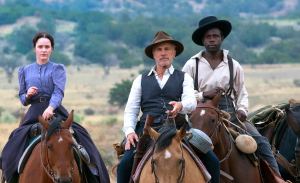 gunfights and ghost towns — the usual stuff — but with a few twists: sympathetic Black and Mexican characters, a tough-as-nails woman who is handy with a gun, and the first showdown I’ve ever seen between two players armed only with horsewhips! Director Walter Hill was huge in the ’80s (with movies like 48 Hours, The Warriors, and a lot of westerns) and he still seems to know what he’s doing.
gunfights and ghost towns — the usual stuff — but with a few twists: sympathetic Black and Mexican characters, a tough-as-nails woman who is handy with a gun, and the first showdown I’ve ever seen between two players armed only with horsewhips! Director Walter Hill was huge in the ’80s (with movies like 48 Hours, The Warriors, and a lot of westerns) and he still seems to know what he’s doing.
Does it work? Occasionally the dialogue veers toward the corny, especially with Willem Dafoe, but Christoph, Brosnahan and the rest are understated just enough to keep it a believable western and not just a farce.
Co-Wri/Dir: Gabe Polsky (Based on the novel by John Williams)
It’s the 1870s in Kansas.
Will (Fred Hechinger) is an idealistic son of a Boston minister, heading west in a covered wagon. He left Harvard to have some real experiences in the wild west. He arrives at Butcher’s Crossing a small frontier town, to visit JD McDonald (Paul Raci), an old family friend who his father had rescued when he was down and out. Now he has made his riches cornering the buffalo skin market in the area. But far from being grateful or kind, he rudely tells Will to go back where he came from — this was no place for a pampered city boy like him. So Will turns to a local legend instead. Miller (Nicholas Cage) is a big guy with a shaved head, a bushy black beard and an abrasive manner. But he agrees to take Will with him on the greatest buffalo hunt ever — if he agrees to finance it. Miller knows of a secret valley in Colorado, with untouched beasts just waiting to be slaughtered. Charlie  (Xander Berkeley) a bible-thumping old souse, will serve as the cook, and Fred, (Jeremy Bobb) a man with a mercenary mind-set will be the all-important skinner, cutting the pelts off the carcasses.
(Xander Berkeley) a bible-thumping old souse, will serve as the cook, and Fred, (Jeremy Bobb) a man with a mercenary mind-set will be the all-important skinner, cutting the pelts off the carcasses.
The four set out into the bush, and to everyone’s surprise Miller’s legendary Colorado valley does actually exist. The men dig in and start their gruesome massacre. The herd is untouched, so has no fear of humans. But the enormity of the mass slaughter starts getting to all of them. Except, that is, the obsessive Miller who is determined to kill every last one. Can the four of them stay together without going crazy? Can they leave the valley before they’re trapped by winter snow? And what will they do with the untold wealth their pelts will bring?
 Butcher’s Crossing is a moving western about the mass slaughter of buffalo. The scenery and cinematography is stunning – they were given access to shoot among actual buffalo herds. It mainly deals with the brittle relationships amongst the four men. The acting Is good, especially Fred Hechinger, reprising his role in the White Lotus TV series as an earnest rich kid trying to find the meaning of life. And Nicholas Cage is allowed to do his requisite I’m going mental! scenes, but mercifully with the sound turned off.
Butcher’s Crossing is a moving western about the mass slaughter of buffalo. The scenery and cinematography is stunning – they were given access to shoot among actual buffalo herds. It mainly deals with the brittle relationships amongst the four men. The acting Is good, especially Fred Hechinger, reprising his role in the White Lotus TV series as an earnest rich kid trying to find the meaning of life. And Nicholas Cage is allowed to do his requisite I’m going mental! scenes, but mercifully with the sound turned off.
The story is similar to Ken Lum’s recent controversial  Edmonton bronze sculpture which shows a buffalo hunter, sitting on a mountain of pelts, confronted by a stoic bison. What both imply (but never explicitly show) is the catastrophic effect the decimation of the buffalo populations had on countless indigenous nations. But that’s where the hidden force of this movie comes from — you can’t help but wonder: what are these men doing and why? The senseless slaughter of millions of buffalo in a very short period of time completely changed North American history. And the film leaves you feeling the heavy weight of our ancestors’ actions.
Edmonton bronze sculpture which shows a buffalo hunter, sitting on a mountain of pelts, confronted by a stoic bison. What both imply (but never explicitly show) is the catastrophic effect the decimation of the buffalo populations had on countless indigenous nations. But that’s where the hidden force of this movie comes from — you can’t help but wonder: what are these men doing and why? The senseless slaughter of millions of buffalo in a very short period of time completely changed North American history. And the film leaves you feeling the heavy weight of our ancestors’ actions.
Bros and Butcher’s Crossing both had their world premieres at TIFF this year. Dead For a Dollar and Bros both open across North America this weekend; check your local listings.
This is Daniel Garber at the Movies, each Saturday morning, on CIUT 89.5 FM and on my website, culturalmining.com
Ambitions. Films reviewed: Minions: The Rise of Gru, Ennio, Mr Malcolm’s List
Hi, this is Daniel Garber at the Movies for culturalmining.com and CIUT 89.5 FM.
Summer is definitely here, and this long holiday weekend is the perfect time to take in some new movies. This week I’m talking about three of them: — a rom-com, a cartoon and a documentary — about people with ambitions. There’s a spinster in Victorian England who wants revenge on the man who has scorned her; a spaghetti western composer in 1960s Italy who wants to be taken seriously; and a little boy in San Francisco in the ’70s who wants to become a super villain.
Dir: Kyle Balda, Brad Ableson, Jonathan del Val
It’s the late 1970s, and Gru is a little kid in elementary school. While his classmates say they want to be a fireman or a ballet dancer when they grow up, Gru wants to be a super villain. And he has a basement filled with strange mechanical devices to prove it. They were built with the help of his minions. The minions are bright-yellow, lozenge-shaped creatures with googly eyes. Dressed in matching denim overalls, they speak their own incomprehensible dialect, a mishmash of all the world’s languages. Gru idolizes a gang of six supervillains, who are now one villain short of a pack (since they did away with their leader) and are looking for a replacement. But when he shows up for an interview at their secret hideaway they dismiss him as just a kid. To prove them wrong, he steals their prize possession, a Chinese jade-green amulet. He gives it to a minion to keep it safe, who soon loses it in exchange for a pet rock. (The minions aren’t always the brightest bulb in the chandelier.) Gru is kidnapped by the villains’ former leader, and threatened  with torture and death. Can the minions find the amulet, bring it to San Francisco, and save their best friend, Gru?
with torture and death. Can the minions find the amulet, bring it to San Francisco, and save their best friend, Gru?
Minions: The Rise of Gru is a funny, easy-to-watch kids’ movie, where the villains are the good guys, even though they’re evil. It’s a prequel to the surprise hit from 2010, Despicable Me. The voice actors are mainly American or British, but the animated film is actually from France. The catchy soundtrack, groovy 1970s characters, the San Francisco setting, the fast-moving plot and the very colourful graphics make it a fun watch. It stars the voices of Steve Carell as Gru, Pierre Coffin as all of the minions, and Alan Arkin, Taraji P. Henson, Jean-Claude Van Damme, Jill Lawless, Danny Trejo, Dolph Lundgrin as the six villains. I enjoyed Minions, but the five-and-under set that filled the theatre absolutely loved it.
Dir: Giuseppe Tornatore
Ennio Morricone is born in Rome in 1928 to a professional trumpet player. He enters a music conservatory at the age of 12 and studies under Italian composer Goffredo Petrassi. (He spends most of his life yearning to be taken seriously by Petrassi and the rest of the traditional music establishment.) At an early age, he’s already composing and arranging pieces which include both melodic themes and counterpoint, an oft repeated characteristic of his music. He writes the tunes for a number of pop songs, and eventually gets a job working for RCA. From there he goes on to compose the soundtracks — always anonymously — for the new film genre known as Spaghetti Westerns. But when he recognizes a director’s name from his elementary school, he becomes a close friend and life-long collaborator with Sergio Leone. He quickly rises to fame writing the distinctive musical scores of films like A fistful of Dollars and The Good the Bad and the Ugly, using harmonicas, whistling, electric guitars, and sound effects in place of the more common symphony orchestras. (Today those films remain his most ![]() recognizable works.) He also forms an experimental group that makes improvisational music out of non-musical sounds, influenced by avant-garde composer John Cage.
recognizable works.) He also forms an experimental group that makes improvisational music out of non-musical sounds, influenced by avant-garde composer John Cage.
Morricone goes on to compose the scores of over 500 films, working with Italian masters like Pasolini, Wertmüller and Bertolucci, the giallo horror/thriller director Dario Argento, and Giuseppe Tornatore director of Oscar winner Cinema Paradiso (who also directed this doc).
Ennio died in 2020, and this film is as much a loving tribute to the composer as it is a documentary. While it reveals Morricone’s personality quirks, there are no scandals or salacious secrets of his private life. It’s told using film clips, period footage, audio tracks and many talking heads commenting about him, including fellow composers, John Williams and Hans Zimmer, stars and directors he worked with like Quentin Tarantino Terrance Mallick and Clint Eastwood. (Eastwood says something like Morricone’s music provided the emotions that he never could) Then there are also a bunch of celebs — Bruce Springsteen, Pat Metheny, Wong Kar-Wai — who probably never worked with him, but just felt like praising him or commenting on how he influenced them. Ennio is an informative and fascinating doc, and I liked it a lot, but… couldn’t Tornatore have told this story in 90 minutes, instead of the two and a half hours he took?
Dir: Emma Holly Jones
It’s England in the early 19th century. Julia and Selina were best friends at boarding school, but haven’t seen each other in years. Which is why Selina the pure and virtuous daughter of a country vicar (Freida Pinto) is surprised to receive an invitation to visit Julia an upper-class city woman (Zawe Ashton), after all these years. But she does have a reason: she was slighted by a man who took her to the opera once and never called back. The man is Jeremy Malcolm (Sope Dirisu), who is also the most eligible bachelor in town, not least because he inherited a lot of money. And Julia can’t bear being slighted in public (made even worse when it was depicted in a widely circulated cartoon pamphlet). First Julia turns to her cousin Cassy (Oliver Jackson Cohen) who happens to be Malcolm’s best friend and wingman, who knows all of his secrets. Somehow he leaks the biggest secret of all: that Mr Malcolm keeps a list of 10 characteristics a woman must have for him to consider marrying her — things like talent, poise, intelligence, a knowledge of politics, literature and the arts and one who easily forgives small offences.
Enter Selina. Would she go along with Julia’s scheme — to date Mr Malcolm, knowing what was on that list, and afterwards to dump him — so Julia can get her sweet revenge? Selina is  hesitant but agrees at least to meet him. And wouldn’t you know it? It’s love at first sight. This is further complicated by another man, a dashing military officer (Theo James), who likes Celina a lot, and happens to be in town on the same day. Which one will she choose? And if it’s Mr Malcolm, what will become of Julia’s nefarious revenge plot?
hesitant but agrees at least to meet him. And wouldn’t you know it? It’s love at first sight. This is further complicated by another man, a dashing military officer (Theo James), who likes Celina a lot, and happens to be in town on the same day. Which one will she choose? And if it’s Mr Malcolm, what will become of Julia’s nefarious revenge plot?
Mr Malcolm’s List is a classic, Jane Austen-style light romantic comedy, complete with a masquerade ball, a hidden scheme, whacky relatives, and star-crossed lovers. There are also some modern twists. The most obvious is the colour-blind casting, with Black, Indian, White and East Asian actors playing the various roles, without ever bringing up questions of race or ethnicity. Like the musical Hamilton, the film The Personal History of David Copperfield, and, most recently, the Netflix series Bridgerton, this film shows that race on the screen doesn’t need to have any special significance — it just is. Family bloodlines and facial resemblances are not part of the plot. I think it 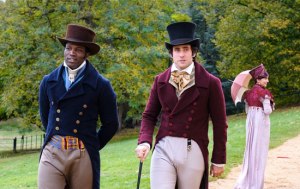 works great in this movie, and I hope to see more of it. The mansions are all stately, the costumes — though a bit odd-looking — are all pretty. And the actors and the characters they play are quite delicious. They’re clearly having a good time doing this. You can revel in their ludicrous scheming without ever taking it too seriously. Even the credits — accompanied by quaint hand-coloured drawings — are delightful. Rom-coms are not my cuppa tea, but if I have to watch one, I like it when they‘re like this.
works great in this movie, and I hope to see more of it. The mansions are all stately, the costumes — though a bit odd-looking — are all pretty. And the actors and the characters they play are quite delicious. They’re clearly having a good time doing this. You can revel in their ludicrous scheming without ever taking it too seriously. Even the credits — accompanied by quaint hand-coloured drawings — are delightful. Rom-coms are not my cuppa tea, but if I have to watch one, I like it when they‘re like this.
Ennio is one of many films playing at the ICFF; Mr Maxwell’s List, as well as Minions: the Rise of Gru both open this weekend: check your local listings.
This is Daniel Garber at the Movies, each Saturday morning, on CIUT 89.5 FM and on my website, culturalmining.com
 Sometimes I Think about Dying
Sometimes I Think about Dying up to him? Can she reveal her secret? And will she ever smile?
up to him? Can she reveal her secret? And will she ever smile? Argylle
Argylle himself, fighting for the good guys. He manages to fight off dozens of would be assassins and brings Elly to safety. She grabs her cat and they fly off to Europe. But this is just the first step in a whirlwind journey of international intrigue, where the CIA — the good guys?! — are fighting the bad guys (a sinister cabal known as The Division) for worldwide domination. Why does everyone think her fiction is prophetic?
himself, fighting for the good guys. He manages to fight off dozens of would be assassins and brings Elly to safety. She grabs her cat and they fly off to Europe. But this is just the first step in a whirlwind journey of international intrigue, where the CIA — the good guys?! — are fighting the bad guys (a sinister cabal known as The Division) for worldwide domination. Why does everyone think her fiction is prophetic? The story makes marginal sense, with so many U-turns and double crosses your head will spin. But that’s not what the movie is about. It’s there for sheer entertainment — a ride on planes, trains and ice skates — as the film chugs along its merry way. Visually, it’s one giant green screen, with endless CGI and special effects, to the point where it’s almost a cartoon. Is that Henry Cavill’s face and hair or a computer generated plastic figurine? Is that Bryce Howard’s breasts or a CGI simulacrum? Who knows? Who cares!
The story makes marginal sense, with so many U-turns and double crosses your head will spin. But that’s not what the movie is about. It’s there for sheer entertainment — a ride on planes, trains and ice skates — as the film chugs along its merry way. Visually, it’s one giant green screen, with endless CGI and special effects, to the point where it’s almost a cartoon. Is that Henry Cavill’s face and hair or a computer generated plastic figurine? Is that Bryce Howard’s breasts or a CGI simulacrum? Who knows? Who cares!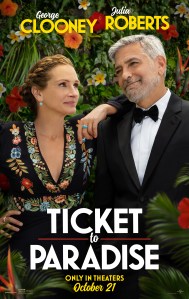
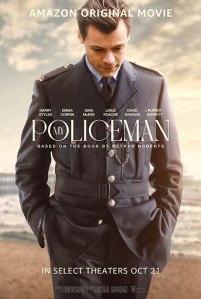
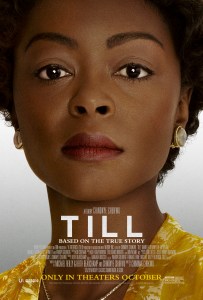

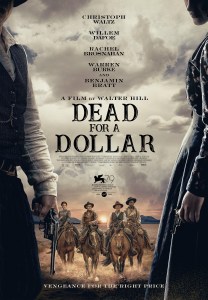
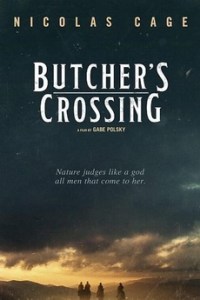



leave a comment